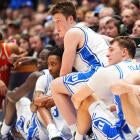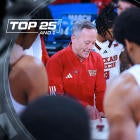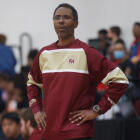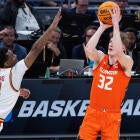Unusually critical comments reportedly made last week in an open forum by the University of Maryland president have created a stir.
According to a report from the Raleigh News & Observer, Maryland president Wallace Loh said he believes the ongoing NCAA investigation into academic fraud at the University of North Carolina “would lead” to the NCAA shutting down athletic programs -- the so-called “death penalty.”
The death penalty in college sports is simply defined: The NCAA prohibits you from competing for a full year. The last time this happened at the Division I level was 1987, infamously with SMU football. It is exceedingly unlikely that the NCAA would go to such drastic measures with one of the most powerful basketball programs in history, as current NCAA president Mark Emmert has spoken out against the death penalty in the past.
Yet Loh believes this punishment could be down the pike for North Carolina? Here’s more from Andrew Carter of the News & Observer:
Loh made the comments during a University of Maryland senate meeting last Thursday. An audio file of a portion of the meeting, which was open to the public, was sent on Monday to the News & Observer. Loh’s commentary about UNC came during a question-and-answer portion of the meeting.
An individual who identified himself as a member of the University of Maryland faculty asked Loh how he could be certain that the university is “protected from the corrupting influence of athletics.” In response, Loh made an unprompted reference to UNC.
“As president I sit over a number of dormant volcanoes,” Loh said. “One of them is an athletic scandal. It blows up, it blows up the university, its reputation, it blows up the president.
“For the things that happened in North Carolina, it’s abysmal. I would think that this would lead to the implementation of the death penalty by the NCAA. But I’m not in charge of that.”
...
Meanwhile, Joel Curran, the Vice Chancellor of Communications at UNC, said UNC officials were “surprised” by Loh’s commentary.
“We were surprised that a sitting university president with no direct knowledge of our case would choose to offer such uninformed and highly speculative opinions,” Curran wrote in an email. “Clearly, Dr. Loh misunderstands the facts of the case, and how NCAA bylaws apply to those facts. We are now preparing our response to a third Notice of Allegations and suggest he read it fully once it has been submitted to the NCAA and made public.”
Loh’s comments are startling because you seldom see an administrator publicly speak out against another school. The comments are also interesting considering that Maryland was, for more than five decades, a member of the ACC. It has been in the Big Ten since 2014. One wonders: If Maryland and UNC shared conference allegiances, would Loh have said what he said?
The NCAA has gone through three iterations of the investigative process in regard to UNC, dating back to the case first coming to light in 2010. Its most recent Notice of Allegations was handed down last December. The basis of the probe deals with phony courses that saw enrollment from students inside and outside athletics at the university. The number of UNC student-athletes who took the courses over the years (dating back to the tail end of Dean Smith’s tenure) was at such a high ratio, the NCAA opted to take on the case and could potentially bring down major sanctions in men’s and women’s basketball, if not football as well.
UNC-NCAA timeline
In the past, when academic fraud has been widespread beyond mere student-athletes, the NCAA has not delved into those matters, rather leaving the universities to police and correct the issues themselves. UNC’s alleged academic fraud went unchecked for more than a decade, though, and could be a watershed case in NCAA history.
North Carolina is expected to meet with the NCAA’s Committee on Infractions later this year.
![[object Object] Logo](https://sportshub.cbsistatic.com/i/2020/04/22/e9ceb731-8b3f-4c60-98fe-090ab66a2997/screen-shot-2020-04-22-at-11-04-56-am.png)


















